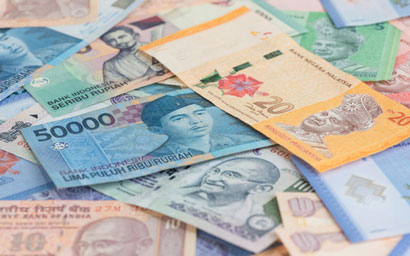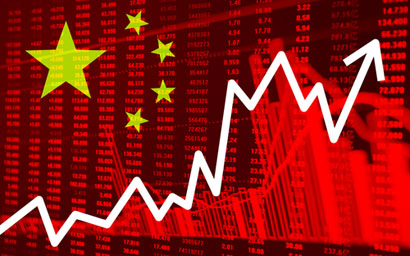Investors say China’s zero-Covid 19 policy and sluggish growth prospects leave India as the standout Asian emerging market, but is mean reversion likely? David Whitehouse investigates.
India’s faster GDP growth is impossible to ignore, according to Mark Mobius, the veteran emerging-markets investor who spent 30 years at Templeton Emerging Markets before starting Mobius Capital Partners in 2018. “Earnings are tied to a great extent to GDP. India looks terrific”.
Many individual Indian company valuations on forward-looking price-to-earnings and return on capital ratios are still “reasonable”, Mobius said from Dubai in early September. Covid-19 lockdowns in China, meanwhile, are hurting exports, he added.
India’s economy grew by 13.5% in the first quarter of fiscal 2022 from April to June, while China’s GDP growth in the same period was 0.4%. Mobius has an investment in Indian technology company Persistent Systems, which at the end of July accounted for 4.2% of the fund.
India made up 9.6% of the portfolio at that date, compared with 12.7% for China and 26.7% for Taiwan, the largest single country weighting.
Tensions over Taiwan cloud China’s prospects and harm its relationship with the US, Mobius says. He does not expect to see a Chinese invasion and says the context differs from that in Ukraine.
China considers Taiwan as part of China and the Taiwanese as Chinese, he says. That will make it hard or impossible to count as an armed conflict in which the US and Japan would not sit back and watch, he argues.
Vaccine hurdle
In September, 70 Chinese cities remained under full or partial Covid-19 lockdowns, affecting more than 300 million people. Authorities point to the low vaccine levels among the elderly and weaknesses in rural healthcare systems. China’s unwillingness to use foreign vaccines is at the heart of the problem, says Rob Brewis, a fund manager at Aubrey Capital Management in Edinburgh.
Many old people are unwilling to use even domestically made vaccines, which are not as effective as those made abroad. The result, in stark contrast to Western countries, is a low rate of vaccination for the over-60s, which drops even further for the over-80s, Brewis says. Hong Kong, which has seen high death rates among the elderly, has been taken as a warning by the authorities, he adds.
The authorities have shown signs of being able to achieve a more targeted approach with aggressive testing and local rather than large-scale lockdowns, he says. But an unwillingness to be vaccinated is not going to go away soon. Lockdowns have had “a lot of impact on consumer sentiment. There is no quick fix. This will continue”.
“The rest of the world has evolved its approach to covid-19, while china hasn’t.”
There have been signs of improvement, with Beijing shopping malls recently full again, Brewis says. In terms of consumer sentiment, “the worst may be behind us”. One consequence of the lockdowns is that demand remains pent up, he argues. That means it may be a good time to add Chinese exposure for investors able to take a long enough view. There is a “terrible sentiment”, which is reflected in stock prices, but “spending power is still in place”.
Brewis agrees that the winner from China’s slowness in recovering from Covid-19, combined with the eclipse of Russia as an emerging market, is India. A young population, the country’s trend towards urbanisation and “vastly improved” economic management creates “huge potential”, he contends. If the world wants to reduce its supply- chain dependence on China, then India, along with Vietnam, are the obvious alternatives, he says.
A long rear-mirror view shows that India has performed much better than China as an investment over three decades, Brewis says. An investment in the MSCI India Index in 1993 would have grown more than sevenfold while backing the MSCI China Index would have lost money. As well as diversification, that contrasting performance points to a need for active management, Brewis argues. “You can’t be passive. It’s a recipe to lose”. The Indian stock market was expensive in late 2021 and early 2022, but valuations have moderated amid strong earnings growth, he says. “Valuations have come into much more attractive territory”.
Contrarian stance
The zero-Covid 19 policy has been “a major challenge for us, the Chinese economy and the market”, says Douglas Turnbull, an emerging markets fund manager at Invesco in London. Chinese stocks now trade at their lowest prices to earnings and book value for the best part of a decade, and market sentiment is “extremely negative”, he adds. “The rest of the world has evolved its approach to Covid-19, while China hasn’t”.
Turnbull manages the emerging markets sub-portfolio of Invesco’s Global Smaller Companies Fund. He currently has emerging market exposure of about 18% to China, with a similar weighting for India. The global fund has Chinese exposure of about 3%.
Still, Turnbull has been gradually increasing his China exposure in recent months. He describes the fund as “contrarian by nature. That’s ultimately how you make money”. The market has extrapolated Chinese Covid-19 policy to price in “structural decline” while the factors hurting sentiment are “specific and potentially transitory. There’s far too much negativity priced in”. The market view of the property sector is “overly negative”, he says. The authorities “don’t need to step off the accelerator – just take their foot off the brake”.
 While there won’t be any sudden move to drop the zero-Covid 19 policy, “the mood music points to an ability to gradually walk it back”, Turnbull says. While periodic lockdowns are to be expected, they won’t be on the scale seen in Shanghai earlier this year, he adds. “They will subtly walk away” from zero-Covid 19 without telling anyone.
While there won’t be any sudden move to drop the zero-Covid 19 policy, “the mood music points to an ability to gradually walk it back”, Turnbull says. While periodic lockdowns are to be expected, they won’t be on the scale seen in Shanghai earlier this year, he adds. “They will subtly walk away” from zero-Covid 19 without telling anyone.
Turnbull agrees that zero-Covid 19 is, in practice, almost impossible to achieve and says that Chinese failure to achieve effective mass vaccination is a “head-scratching” question. Vaccinations are still progressing, which will gradually create more scope for flexibility, he adds.
The vaccination rate among China’s elderly needs to be increased, and even if a zero-Covid 19 goal were somehow attained, the question would then turn to how to maintain it by avoiding cross-border contacts, according to William Scholes, an emerging markets fund manager at Premier Miton Investors in London.
India is Scholes’ favoured emerging market. He sees signs of a positive housing market cycle, combined with greater corporate capital expenditure. “It’s worth paying up for. India can grow almost regardless of the rest of the world”. Banking returns are improving, with banks set to finance both corporate growth and housing demand, he adds. The long-term outperformers in emerging markets, Scholes says, correlate with positive earnings surprises. “People pay up for that certainty”.
Reversion to mean?
There is a case to be argued for reversion to mean in some sectors in China, says Scholes, a former investment director at abrdn plc. These include internet platforms and export sectors such as biotech, drug development and renewable energy components. There are businesses in these areas that offer “excellent value”. Sectors that are mainly geared to domestic growth are likely to remain affected by lockdowns, he says.
A longer-term risk is currency depreciation. There is a lot of liquidity stored up onshore, which has not been able to leave mainland China, Scholes says. “It might not become a risk for ten years, but it is still a risk”.
“India can grow almost regardless of the rest of the world.”
Chinese small caps, argues Turnbull at Invesco, are to be preferred to large caps, where banks and internet stocks are heavily represented. Chinese banks are “challenging to analyse”, while internet shares have suffered as regulators adapt the rules to evolving business models, he says. Companies with whom Turnbull has been speaking, including an auto dealership, indicate that underlying demand is “nowhere near as bad” as realised sales. Renewable energy and gas storage are also sectors that are holding up well. There is “definitely a recovery trend” in place, he says, which should provide a tailwind for other emerging markets such as Taiwan, South Korea and Brazil.
Turnbull suspects that a Chinese recovery will draw away some investment interest from India. There is “some degree of a zero-sum game” between the two markets, he says. Indian price-to-earnings multiples are high relative to both, China and its own historical level, and there is likely to be some mean reversion. “I question the sustainability of the India premium and the China discount.”
Some Chinese companies will do well, but a selective approach is needed, Mobius says. “Active management is very important in the current environment. Don’t back the Chinese index and think it will work out – it won’t”.
© 2022 funds europe





